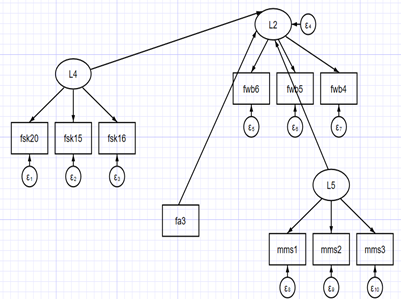Determinants of Financial Well Being: A Study of Urban Working Women in West Bengal
DOI:
https://doi.org/10.5281/zenodo.17060279Keywords:
financial autonomy, financial skills, financial well being, money management stress, urban working womenAbstract
This study investigates the facilitating role of Financial Skills and Financial Autonomy on Financial Well Being of Urban Working Women in West Bengal. In the methodology of the research study, a primary survey was carried out in a cross-sectional manner and 332 participants were studied. It investigates the structural covariance among latent factors like Financial Autonomy, Financial Skill (FSK), Financial Well-being (FWB), and Money Management Stress (MMS) through Structural Equation Modelling (SEM). The questionnaire comprised of validated questions that evaluated the constructs of interest, and it was developed through a literature review of financial behaviour and psychological well-being found in Behavioural Economics Literature. The final SEM model consisted of three latent variables as per a well-established theoretical framework. The findings indicate that Financial Skills in combination with Financial Autonomy or the ability of an individual to independently manage their finances, make informed financial decisions, and take effort towards their own financial goals emphatically increases Financial Well Being and reduces Money Management Stress in Urban Working Women.
Downloads
References
Anand, S., Mishra, K., Verma, V., & Taruna. (2021). Financial literacy as a mediator of personal financial health during COVID-19: A structural equation modelling approach. Journal of Financial Counselling and Planning.
Anand, S., Mishra, K., Verma, V., & Taruna. (2022). Measuring financial wellbeing with self-reported and bank-record data. International Journal of Financial Research, 13(1), 1–15.
Bahl, M. (2022). A comparative study to assess the financial decision-making among working women in India and Singapore. International Journal of Economics and Business Research, 21(3), 205–220.
Banerjee, T., & Roy, M. (2022). Financial literacy: An intra-household case study from West Bengal, India. Journal of Economic Studies, 49(3), 563–580.
Banerjee, T., & Roy, M. (2022). Financial literacy in the state of West Bengal: A study into its determinants with an impact analysis on financial inclusion and investment decision-making. Journal of Financial Education, 38(1), 27–50.
Gautama, C., Wadhwa, R., & Ramachandran, T. V. (2021). Examining behavioural aspects of financial decision-making: The working women perspective. International Journal of Behavioural Economics, 10(2), 83–96.
Ghosh, A. (2020). A study of the role of West Bengal government in women empowerment. Journal of Public Policy and Administration, 8(1), 75–92.
Jain, A. (2021). An empirical study on the investment behaviour of female investors in the city of Howrah, West Bengal. International Journal of Investment Research, 14(3), 145–158.
Joo, S. H. (2008). Personal financial wellness. in J. J. Xiao (Ed.), Handbook of consumer finance research (pp. xx–xx). Springer.
Kochar, A., Nagabhushana, C., & Sarkar, R. (2021). Financial access and women’s role in household decisions: Empirical evidence from India’s national rural livelihoods project. Development Policy Review, 39(1), 119–136.
Kumar, P., Pillai, R., & Tabash, M. I. (2021). The interplay of skills, digital financial literacy, capability, and autonomy in financial decision-making and well-being. International Journal of Financial Studies, 9(3), 32. https://doi.org/10.3390/ijfs9030032
Kundu, K., & Das, J. K. (2021). Financial literacy among working women: A study in West Bengal. Journal of Women and Economy, 15(1), 58–75.
Mishra, L. (2022). Financial planning for educated young women in India. Journal of Financial Planning, 35(1), 25–37.
Organisation for Economic Co-operation and Development. (2009). Measuring financial literacy: Questionnaire and guidance notes for conducting an internationally comparable survey of financial literacy. OECD. https://www.oecd.org/finance/financial-education/49319977.pdf
Pauri, R. A., & Mehra, S. (2021). Financial attitude-based segmentation of women in India: An exploratory study. Journal of Consumer Marketing, 38(5), 543–558.
Panda, P. K. (2022). A study on the investment behaviour of the people of Malda town, West Bengal. Journal of Economic Behaviour, 40(2), 234–248.
Paul, R., Goswami, A., & Pal, B. (2021). Effect of socio-economic aspects on women workforce participation level in West Bengal, India. Asian Journal of Women’s Studies, 27(3), 329–344.
Roy, M. L., & Kadian, K. S. (2021). Participation in decision-making on farm and household-related economic activities: A study of West Bengal. Journal of Agricultural Economics, 73(4), 1028–1045.
Wagner, J., & Walstad, W. B. (2023). Gender differences in financial decision-making and behaviours in single and joint households. The American Economist, 68(1), 5–23. https://doi.org/10.1177/05694345231152267

Published
How to Cite
Issue
Section
License
Copyright (c) 2025 Patralika Bhattacharjya, Susmita Chatterjee, Navin Kumar Jha

This work is licensed under a Creative Commons Attribution 4.0 International License.
Research Articles in 'Management Journal for Advanced Research' are Open Access articles published under the Creative Commons CC BY License Creative Commons Attribution 4.0 International License http://creativecommons.org/licenses/by/4.0/. This license allows you to share – copy and redistribute the material in any medium or format. Adapt – remix, transform, and build upon the material for any purpose, even commercially.









